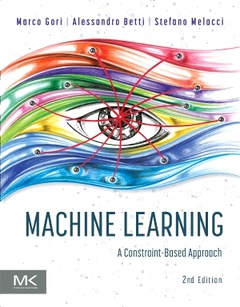Machine Learning (2nd Ed.) A Constraint-Based Approach

The book presents a simpler unified notion of regularization, which is strictly connected with the parsimony principle, including many solved exercises that are classified according to the Donald Knuth ranking of difficulty, which essentially consists of a mix of warm-up exercises that lead to deeper research problems. A software simulator is also included.
1. The Big Picture 2. Learning Principles 3. Linear-Threshold Machines 4. Kernel Machines 5. Deep Architectures 6. Learning from Constraints 7. Epilogue 8. Answers to selected exercises
(http://www.topitalianscientists.org/top_italian_scientists.aspx). Dr. Gori is a fellow of the IEEE, ECCAI, and IAPR.
Alessandro Betti Ph.D. is a Postdoctoral Researcher in the Department of Information Engineering and Mathematics (DIISM) of the University of Siena (Siena, Italy). Dr. Betti’s interests include analysis of algorithms, discrete mathematics, tree structures, and formulation of “learning laws through least action like principles.
Stefano Melacci Ph.D. is a Senior Researcher (Tenure-Track Assistant Professor) in the area of Computer Science at the Department of Information Engineering and Mathematics, University of Siena (Siena, Italy). He has been the Research Manager of the Italian company QuestIT S.r.l. (Siena, Italy) and a Research Fellow of the Department of Information Engineering and Mathematics, University of Siena, where he received his PhD (2010), and the M.S. Degree (cum Laude). Since 2017 he has served as Associate Editor for the IEEE Transactions on Neural Networks and Learning Systems, and he is an active reviewer for several journals and international conferences.
His profile is strongly characterized by research activity in the fields of Machine Learning and, more generally, Artificial Intelligence. Recently, he has been working on new technologies for Machine Learning-based Conversational Systems and he studied and proposed Multi-Layer architectures (Deep Networks) for extracting information from static images and videos, using adaptive con
- Presents, in a unified manner, fundamental machine learning concepts, such as neural networks and kernel machines
- Provides in-depth coverage of unsupervised and semi-supervised learning, with new content in hot growth areas such as deep learning
- Includes a software simulator for kernel machines and learning from constraints that also covers exercises to facilitate learning
- Contains hundreds of solved examples and exercises chosen particularly for their progression of difficulty from simple to complex
- Supported by a free, downloadable companion book designed to facilitate students’ acquisition of experimental skills
Date de parution : 04-2023
Ouvrage de 560 p.
15.2x22.8 cm
Thèmes de Machine Learning :
Mots-clés :
environmental constraints; parsimony principles; structured data; risk functions; learning modes; pseudo-inversion; ridge regression; discriminant functions; error metrics; shrinkage methods; deep nets; polynomial pre-processing; kernel functions; spatial constraints; temporal constraints



